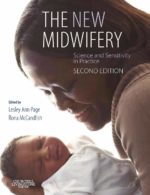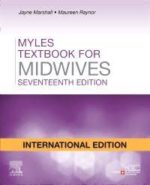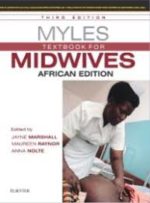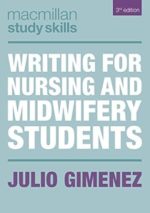-
Seller’s Midwifery 3e
KSh 19,838.00This third edition has been completely updated to bring it in line with the latest research in the eld, without losing those aspects readers have found to be the most useful, such as:
– the accessible language style, which simpli es a complex subject
– the many detailed line drawings that illustrate anatomy
– the comprehensive nature of the book, which ensures that Sellers’ Midwifery covers the curriculum completely.
Key features
– Comprehensive student and lecturer support material is available, to assist the lecturer with lesson preparation and provide the student with additional opportunities
for study.
– The content is in uenced by the integrated nursing education model that places midwifery in the Higher Education band. The proposed changes to the nursing curricula
have also been considered.
– The content includes evidence-based care principles to improve clinical care.
-
Professional Ethics in Midwifery Practice
KSh 14,140.00Professional Ethics for Midwives: Conscious Practice is an applied ethics book designed for both students and practicing midwives to build ethical thinking in the context of daily practice. This unique text uses an accessible writing style and includes chapters on diversity and justice, informed consent, multiple relationships, confidentiality and privacy, scope of practice, and others. Realistic case examples throughout the text encourage critical thinking in applied ethics. The authors present a unique model for midwives’ ethical thinking and appendices include widely used codes of ethics in the field.
-
The New Midwifery: Science and Sensitivity in Practice 2nd Edition
KSh 9,150.00Discover modern midwifery with The New Midwifery, 2nd Edition. Combines scientific knowledge with compassionate care for effective maternity practice.
Practicing as a midwife today requires not only good clinical skills but also a broad understanding of the social and emotional changes a woman experiences before and after birth. This book combines scientific knowledge with the more intangible skills needed for sensitive communication to provide the best possible care to the mother and her family. The second edition of this celebrated text vividly explores the various skills and approaches that lead to successful midwifery practice and uses care stories to bring these to life.
Provides a refreshingly new approach to key areas of midwifery practice in a way that brings practice to life.
Illustrates and supports the fundamental changes currently taking place in midwifery around the world.
Builds on the most up-to-date, evidence-based research to suggest guidelines for best practices.
Explores the impact of parenthood and offers strategies for effectively supporting individuals during this period of transition.
Includes “care stories” – case studies that highlight positive midwifery care and successful childbirth experiences.
Offers contrasting stories from around the world, illustrating how maternity care in industrialized society differs from that in a non-industrial or third world environment.
Provides up-to-date research and reference material. -
Myles Textbook for Midwives, International Edition, 17th Edition
KSh 5,642.00Written by midwives for midwives, Myles Textbook for Midwives has been the seminal textbook of midwifery for over 60 years. It offers comprehensive coverage of topics fundamental to 21st midwifery practice. Co-edited for the second time, by internationally renowned midwife educationalists, Professor Jayne E Marshall and Maureen D Raynor from the United Kingdom with a team of contributors from across the midwifery community it retains its clear, accessible writing style. Most chapters provide useful case studies, websites of key organisations and charities for individuals to access further information. Reflective questions at the end of each chapter as well as annotated further reading aid reflective learning and stimulate discussions relating to continuing professional development.
Key Features-
- The book covers key frameworks that govern midwifery practice, exploring ethical and legal frameworks that are essential to every accountable, autonomous, professional midwife.
-
- Includes employer-led models of supervision, vital elements of leadership and clinical governance that supports the provision of high quality maternity services and standards of midwifery practice.
-
- The concept of resilience is introduced for the reader to contemplate their personal contribution in creating an environment that is conducive to protecting the wellbeing of themselves and colleagues within the workplace.
-
- The text covers the UN 2030 Agenda for Sustainable Development, highlighting the importance of midwives as global citizens with common goals, and together they form a strong global community prepared to challenge social inequalities and take action to help end extreme poverty.
-
- Covers designing and implementing high quality midwifery care using evidence, policy and models of care. Highlights why a holistic and evidence-informed approach is necessary to achieve effective care for all. Working examples will help the reader to think critically about their own practice.
-
- For this edition several new chapters are introduced covering concealed pregnancy, fear of childbirth (tocophobia), care of the acutely unwell woman and end of life issues including rights of the fetus/neonate and ethical considerations.
Author InformationEdited by Jayne E. Marshall, FRCM, PFHEA, PhD, MA, PGCEA, ADM, RM, RN, Foundation Professor of Midwifery and NMC Lead Midwife for Education, School of Allied Health Professions, College of Life Sciences, George Davies Centre, University of Leicester, UK and Maureen D. Raynor, MA PGCEA ADM RMN RN RM, Senior Lecturer (Midwifery), De Montfort University, Faculty of Health and Life Sciences, School of Nursing and Midwifery, Leicester, UK -
-
Myles Textbook for Midwives African Edition, 3rd Edition
KSh 4,914.00The edition of this seminal textbook, Myles Textbook for Midwives, has been extensively revised and restructured to ensure that it reflects current midwifery practice, with an increased focus on topics that are fundamental to midwifery practice today. The book comes with Elsevier EVOLVE ancillaries – an online learning package which consists of 500 self-assessment questions and answers and a fully downloadable image bank.
- Designed to enable midwifery practitioners to provide safe and competent care, which is tailored to the patient’s individual needs
- Extensively illustrated to assist visual learning with additional ‘pull out’ textboxes to highlight key information
- Streamlined chapters with similar themes and approach help consolidate learning
- Reflects all modern midwifery curricula by presenting a strong emphasis on evidenced-based practice and the use of technology
- Over 500 on-line multiple-choice questions to enable readers to test their knowledge
- Offers a full image bank of downloadable illustrations to assist with personal projects and/or further learning
- References, Further Reading and Useful Websites promote further learning
- Glossary of Terms and Acronyms provide simple definitions of more complex terminologies
- Full colour illustrations now used throughout the book, in response to student feedback
- Contains many new chapters, some of which are authored by members of the multi-professional team
- Up-to-date guidance on professional regulation, midwifery supervision, legal and ethical issues, risk management and clinical governance
- Recognition that midwives increasingly care for women with complex health needs, in a multicultural society
- Examination of the dilemmas involved in caring for women with a raised body mass index
- Chapter on optimising care of the perineum for women with perineal trauma, including those who have experienced female genital mutilation
- Guidance to support the trend for midwives to undertake the neonatal physical examination of the healthy term infant
- Additional coverage of basic neonatal resuscitation
-
Writing for Nursing and Midwifery Students
Combining a theoretical approach with practical activities, this book is invaluable for nursing and midwifery students and will help them to master the basics of writing at university. It equips students with the skills needed to examine cognitive processes such as reflection and critical thinking and includes essential information on referencing correctly and avoiding plagiarism. Going beyond the traditional essay, it provides support and guidance on producing care critiques, action plans, portfolios and journal article reviews alongside complex argumentative writing and undergraduate dissertation proposals.
Written in an engaging and accessible style, this is a comprehensive writing toolkit for students of nursing, midwifery, health and social care. Suitable for students of all levels, it is ideal for use in class or for independent study.
New to this Edition:
– A new section on writing systematic reviews and responding to case studies for assessment purposes
– Extended content on referencing, engaging with sources and critical and argumentative writing, featuring new examples and exercises






